|
|
|
 |
|
"BEHOLD HIS HEAD SHOULD BE THROWN TO YOU OVER THE WALL.
THEN THE WOMAN WENT UNTO ALL THE
PEOPLE IN HER WISDOM.
AND THEY CUT OFF THE HEAD OF SHEBA THE SON OF BICHRI
AND THREW IT TO JOAB."
second SAMUEL 20
|
|
|
 |
|
 |
|
Everyone knows about Absalom
– that he was a long-haired beauty with nary
a blemish from the crown of his head to the
sole of his feet. When Absalom
rebelled against his father David, he had
the misfortune to be caught hanging between
heaven and earth, with his curly mane
twisted in the branches of a terebinth tree
as his mule stubbornly marched onwards.
David’s general Joab squashed the rebellion
when he thrust three darts right into
Absalom’s heart.
But then, an even more serious threat to
David’s reign appeared on the scene.
He was a Benjaminite named Sheba, son of
Bichri. |
|
|
|
When King David saw that the men of Israel
followed Sheba, he feared that Sheba would
do more harm than Absalom and commanded his
army to chase and capture Sheba. Sheba
and his men took refuge in the northern city
of Abel in Beit Maacah, about 5 miles due
west of Dan. Joab and his army laid
siege to the city while battering the wall
in an effort to knock it down. |
|
|
|
 |
|
Courtesy of
NASA |
|
Satellite image of Upper
Galilee including Abel Beit Maacah |
|
|
In the midst of the raging battle, a wise
woman shouted from the city, “Hear, hear,
tell Joab, ‘Come here, that I may speak with
you’.” When Joab approached the city
wall, she asked why he sought to destroy a
mother city (i.e. an important city) in
Israel. Joab replied, “Far be it …if
you give up Sheba son of Bichri who has
lifted his hand against King David, I will
withdraw from the city.” The woman
told Joab, “His head shall be thrown over
the wall to you.”
The unnamed wise woman kept her word and
convinced the residents of Abel in Beit
Maacah to cut off the head of Sheba son of
Bichri and toss it over the wall, like a
Frisbee, to Joab. What a grisly tale!
It ends, however, with Joab blowing the
shofar to announce his retreat back to
Jerusalem, D.C., (David’s capital). |
|
|
|
 |
|
Photo:
Gila Yudkin |
|
View from Dan to the west,
towards Abel Beit Maacah |
|
|
|
In the 1980s when I would take groups up to
the “Good Fence” northern border with
Lebanon, I would point out Abel Beit Maacah
and briefly relate the story. I hadn’t
thought about it for years, until the
hostilities with Lebanon (in the summer of
2006) when Nasrallah, chief of the
Hezbollah, appeared on our TV screens to
taunt us. Suddenly I had a flash – if we
could only find a wise woman in today’s
Beirut, who would convince her fellow
civilians to roll Nasrallah’s head out of a
bunker or a TV studio, then we could quickly
restore peace and tranquility to northern
Israel and southern Lebanon. |
|
|
|
This is a great story with the potential to
spark a lively debate about the nature of
war, the price of peace and the role of
wisdom in negotiating between the two.
On your next visit to the Upper Galilee, ask me to take
you by Abel Beit Maacah and let’s retell the
story of a conflict threatening the lives of
innocent civilians which was resolved by one
wise woman. |
|
| |
|
2018 Update: Mystery of the
Sculpted Biblical King |
| |
|
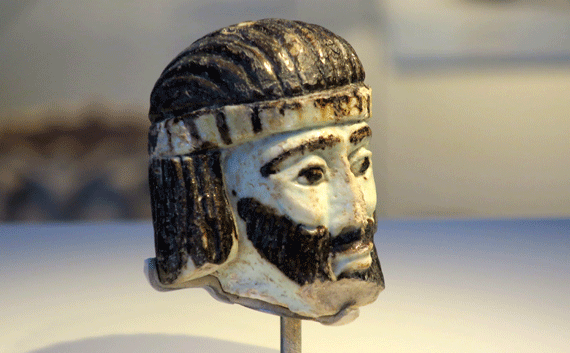 |
|
Head of King ???? found at
Tel Abel Beth Maacah |
| |
|
In June 2018, after five seasons of digging,
excavators at Tel Abel Beth Maacah (also
spelled Abel Beit Maacah) revealed a
magnificent discovery found in a massive
Iron Age structure dated to the ninth
century BC: a five centimeter (two-inch)
sculpture of a king's head. |
| |
|
This extremely rare figurine is made of
faience, a glass-like material popular in
jewelry and small human and animal figurines
in ancient Egypt and the Near East.
The bearded figure's hair is plaited in
thick locks that cover the ears and is held
in place by a striped diadem of gold. His
hair and beard are dark. The hairstyle is
very similar to how the Egyptians depicted
their Near Eastern Semitic neighbors. |
| |
During the ninth century BC, Abel Beth
Maacah (just 4.5 miles to the west of Dan)
was situated in a border zone between three
regional powers: the Aramean kingdom with
its capital in Damascus to the east, the
Phoenician city of Tyre to the west and the
Israelite kingdom with its capital in
Samaria to the south.
Scholars are scrambling to decipher this
mystery: Is this royal figurine a depiction
of the king of Aram (either Ben Hadad or
Hazael of Damascus) OR the king of Tyre (Ethbaal,
father of Jezebel, Ahab's wife)) OR the king
of Israel (either Ahab or Jehu who overthrew
Ahab in a coup)??? Stay tuned… |
|
|
|
Copyright 2006, 2010, 2019 Gila Yudkin.
Permission needed for any reuse. |
| |
|
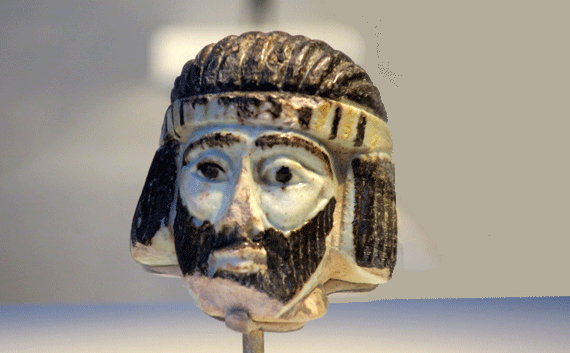 |
|
Five centimeter (2-inch) head of King ????
discovered at Tel Abel Beth Maacah |
| |
|
Gila
Yudkin, who has been living in
King’s David’s court for the past forty
years, wants to be a “wise woman” when she
grows up. In the meantime, her goal as
a guide is to bring the Bible to life and
reveal its tapestry of vivid colors and
moral dilemmas. |
| |
|
When Joab received Sheba's head, he blew the
shofar (ram's horn) to signal that the
battle was over. If you want to know
how Joab may have cleaned his shofar when he
returned to Jerusalem, see "ask
Gila how to clean a shofar." |
| |
|
There is another unnamed wise woman who
plays a supporting role in the time of
David. She lived in Tekoa, a village
not far from Bethlehem. Read about the
discovery
of Herod's Tomb at Herodion which has a
bird's eye view of Tekoa. |
|
|
|
More on
women of the Bible: |
|
|
|
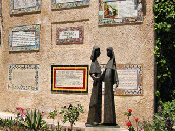 |
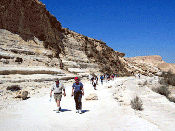 |
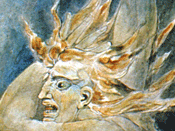 |
|
Mary and Elizabeth |
Sarah in the Negev |
Witch of En Dor |
|
|
|
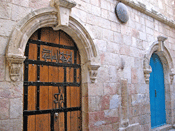 |
 |
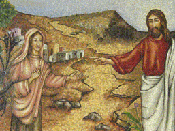 |
|
Veronica |
Queen Mother Bathsheba |
Mary Magdalene |
|
|
|
|
|
GILA
YUDKIN
•
TCHERNIKOVSKI
64A
•
JERUSALEM
•
ISRAEL
gila@itsgila.com
HOME
•
HOLY
LAND
HEROINES •
TIPS
FOR TOURS •
ABOUT GILA
|
|

